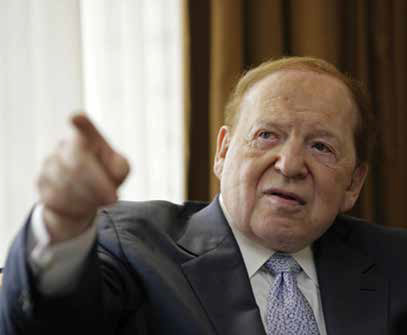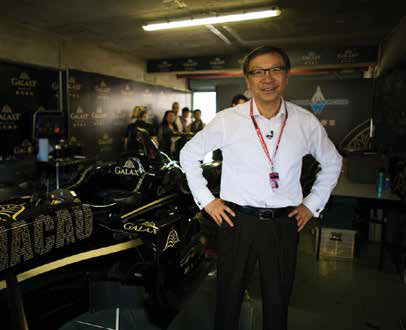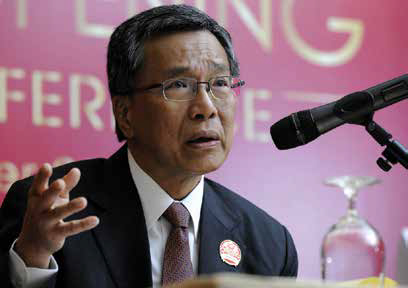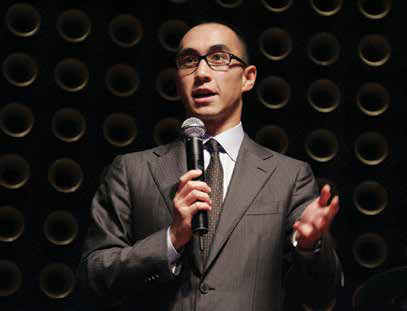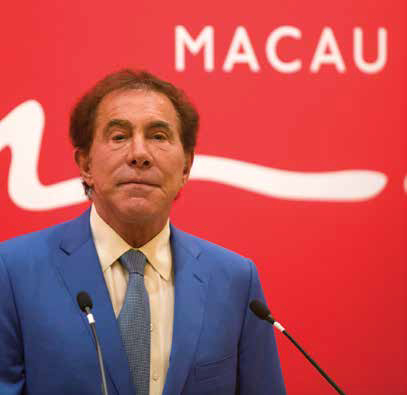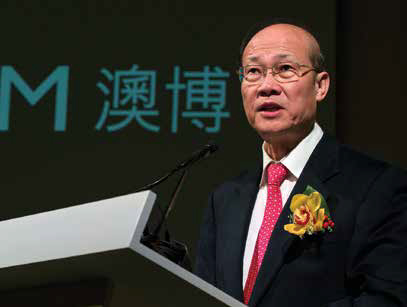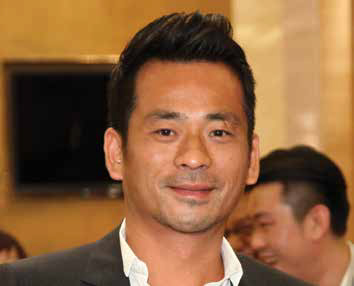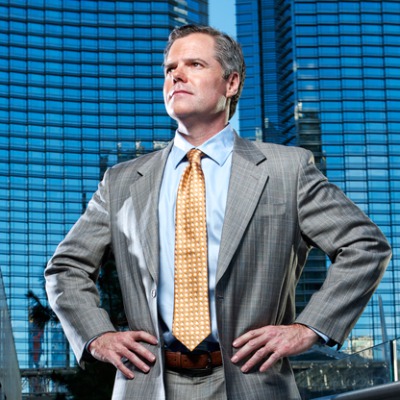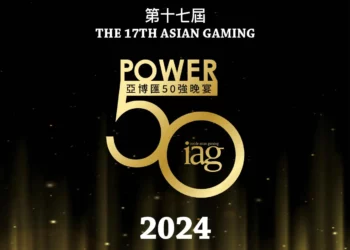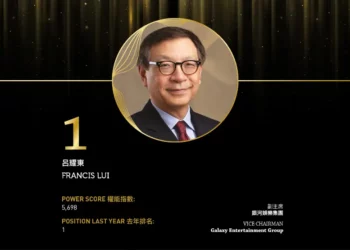1 Sheldon Adelson
Chairman and CEO
Las Vegas Sands Corp.
Chairman and CEO
Sands China
The thing that has always set Sands China apart from the competition is the unshakeable belief of its chairman, backed at the risk of his company’s billions, that Macau could, and would one day, be about a lot more than high-limit baccarat pits thick with cigarette smoke.
With the crash of the VIP market that once propelled the city’s casinos to aggregate gaming revenues seven times the size of the Las Vegas Strip’s, it appears that day has arrived.
As Sheldon Adelson phrased it in his inimitable style during Las Vegas Sands’ second-quarter earnings call—“Now, everybody is cutting off their arms to get into Cotai.”
Cotai … More than US$20 billion is being poured into the reclaimed marsh a short drive by bridge from Macau’s southern tip to create an enclave of super-resorts, each of them in their way designed to replicate the success of the tourist-oriented business model Mr Adelson pioneered almost a decade ago at The Venetian Macao. Until they open, The Venetian is likely to remain the most visited and the most lucrative casino hotel in the city, with more retail shops, more conventions and meetings space, more entertainment and sporting events, more operating profit on more revenue, than any single rival. Even when they do open, none will be able to approach the scale of the $9 billion or so Mr Adelson has invested in Cotai to date, most of it under the auspices of Sands China, the Hong Konglisted subsidiary 70% owned by Las Vegas Sands, founded in 2009 to manage and grow the company’s expanding portfolio of Macau assets. That portfolio today encompasses 45% of the city’s total hotel inventory and more than half of the gaming industry’s—some 9,300 rooms and suites in all, housed in four resort complexes supported by 1.5 million square feet of shopping, 2 million square feet of MICE space, the city’s largest multi-purpose arena, dozens of restaurants and leisure and family-style attractions and five casinos totaling more than 1,500 live table games and more than 3,900 machine games and electronic table game positions. Combined, these operations employ more than 24,000 people full-time. Through the first six months of this year, they generated $901 million in cash.
Given the sheer breadth of the business, Sands China’s EBITDA lead over the rest of the market, calculated by the company through the first quarter at a 34% share on a trailing 12-month’ basis, may well be unassailable.
At the same time, the downturn the market is suffering through— principally the result of a weakening Chinese economy and a nationwide crackdown by the ruling Communist Party on corruption and capital flight—is of a scale that none of the six gaming concessions has been untouched by it. Sands China is weathering it the best to date, though, thanks to the breadth and diversity of the offering. It’s far less reliant on gaming, which accounts for only 85% of total revenues, far less than its competitors. VIP accounts for only one-quarter of its table inventory and contributes a mere 12% or so to gaming revenue. Its mass-market tables are weighted toward the lower end of the spectrum, what it terms “base” mass, at a ratio of almost 3:1 over higher-limit “premium” mass. Sands China’s resiliency relative to the market was clearly apparent in the six months ended in June, when the company was able to hold up a net revenue decline of 30.7% year on year against the market’s minus-37%. Room revenue was down only 6.6% on an occupancy rate that beat the citywide average by 500 basis points. Its market-leading retail sector, which runs at an 85% profit margin, continued to expand and actually grew revenue in the first half and by a robust 22.6%.
Then, of course, there is Marina Bay Sands in Singapore, whose trio of curved 55-story hotel towers stand as the city-state’s most recognizable landmark. An outdoor park stretches the length of the summit and features a 150-meter infinity pool. Below are 2,600 rooms and suites, 160,000 square feet of gaming, 1.2 million square feet of conventions and meeting space, two theaters, a trademark array of restaurants and a full one-third of LVS’s 1.92 million square feet of Asia retail, second only to The Venetian Macao.
Singapore and Macau account for a combined 90% of Las Vegas Sands’ EBITDA and more than 85% of revenues, the cornerstones of the largest multinational resort gaming operation in the world.
“At the heart of our company’s success is having the right strategy,” Mr Adelson explained on the earnings call. “We have the courage of our convictions to build early and aggressively. We developed critical mass to scale and diversification, and we offer products and amenities that are best-positioned to capture long-term tourism and consumption growth in Asia.”
And the building continues. A fourth hotel is slated to open at Sands Cotai Central at the end of this year, a $380 million St. Regis, whose 400 rooms will bring the total at the resort complex to 6,123. Next year will see the debut of the $2.7 billion, 3,000-room Parisian Macao, which will crown Mr Adelson’s Cotai master plan with a halfscale replica of the Eiffel Tower.
Veteran hotelier Michael Leven, a trusted advisor who served four years as president and chief operating officer of LVS, has described Mr Adelson as the “penultimate entrepreneur, incredibly creative and wide-thinking, and incredibly optimistic, which is what you have to be to be a successful entrepreneur.”
Personally and through family interests he controls 54% of Las Vegas Sands’ stock, which has enabled him to amass one of the world’s great fortunes. He is ranked 13th on the Forbes 2015 list of wealthiest Americans, No. 18 in the world, with a net worth valued at $26.3 billion. It is, moreover, one of the few great fortunes that can truly be described as self-made. He has founded more than 50 companies in his 82 years, the first a Boston newspaper stand he started when he was 12 with $200 borrowed from an uncle. He has run vending machines, sold advertising, developed condos and sponsored trade shows. In 1990, he built the Sands Expo and Convention Center in Las Vegas, the first privately funded exhibition facility in the U.S., to house COMDEX, the computer trade show that was the largest event of its kind when he sold it in 1995 for $862 million. The sale provided the seed money for his entry into gaming with The Venetian Resort Hotel Casino on the Las Vegas Strip, the first convention-centered casino in the country.
In his home country he particularly likes Miami. He’s been battling the Disney empire in Florida for three years over it and he’s not giving up. The US Internet gambling lobby took heart earlier this year when reports surfaced that at 80 he might consider retiring. They’ve been reeling from the multimillion-dollar lobbying and public relations campaign he’s launched to secure a federal law to ban the sector. A prominent contingent of corporate Las Vegas wouldn’t be sad to see him go for the same reason. But he’s left them all disappointed. “As the supposed Mark Twain quote goes, the rumors of my demise have been greatly exaggerated,” he said in May. “I am as bullish about this company as I’ve ever been, and I have no plans of slowing down or passing the CEO title or job to anyone. … We have taken an important leadership position in the gaming and hospitality industry, and I plan on spending year after year building on that success.”
Credit Suisse gaming and leisure analyst Joel Simkins remembers rating The Venetian’s bonds back in 1998 as a junior analyst at Moody’s. “They were telling us, ‘We’re going to get $125 midweek from the conventioneers.’ People laughed. But the guy has had a tremendous ability for unlocking opportunities in gaming that no one visualized. … Honestly, you can put him up there with any of the big dreamers we’ve had—Sam Walton, Ray Kroc—the individuals who thought the unthinkable.”
As Mr Adelson himself once explained it, “It wasn’t what I saw, it was what I experienced. I was Las Vegas’ biggest convention customer with COMDEX. And I had a couple other shows. This was my profession for a long time. So I saw it from a different viewpoint. People thought, the operators thought, that the purpose of Las Vegas was gambling. And I said to myself, ‘The purpose of Las Vegas is the fungibility of money.’”
He has been certain from the beginning that the same holds true for Macau, and so far he’s been right. Should the opportunity arise he’ll look to do the same in Tokyo, in Seoul, possibly in Ho Chi Minh City. He has set his investment parameters high. New project costs are to be funded with no less than 25-35% equity. He doesn’t move in without a reasonable expectation of a minimum 20% return.
Interestingly, he intimated some weeks back that he’s “feeling vibrations” that just such an opportunity is about to open up. And if it does, he said, “There isn’t anyone who doesn’t think [LVS] is in the pole positon.”
2 Francis Lui
Deputy Chairman
Galaxy Entertainment Group
As the operator with the biggest share of the Macau VIP baccarat market, Galaxy Entertainment Group continues to be hit hard by the year-and-a-half-long slide in the city’s high-roller business, kicked off by Beijing’s crackdown on corruption and illicit fund flows and worsened by the weakening Chinese economy.
GEG’s gaming revenue, which accounted for 92% of its total revenue, fell 35.7% year on year in the first half of 2015 to HK$23.4 billion ($3 billion), roughly in line with the citywide 37% contraction in gaming revenue during the period.
The first half results reflect only 35 days of operation of the $3 billion expansion of the company’s flagship Galaxy Macau resort, unveiled on 27th May.
Galaxy Macau Phase 2 and the Broadway Macau annex significantly broaden Galaxy’s non-gaming offering, primarily through the addition of a full-fledged shopping mall and broadening of the available F&B options, extension of the wow-factor Grand Resort Deck and opening of ESPA as a new destination spa to join Banyan Tree. It also adds three new hotels to boost the resort’s room count to more than 3,800.
Although the expansion unequivocally boosts GEG’s massmarket and non-gaming appeal, the most noteworthy new elements are aimed squarely at the higher end of the market. The 254-room Ritz-Carlton Macau is the chain’s first all-suite hotel, each suite measuring at least 85 square meters (900 square feet), glistening with marble and gold. The Ritz-Carlton hotel tower also hosts the Sky 88 gaming area on its 51st floor, designed to offer the cachet and ambience of leading VIP rooms to premium-mass players.
Commenting on the expansion, Credit Suisse analysts Kenneth Fong and Isis Wong warned that: “Despite our full confidence in management’s solid execution and the product, the current weak demand, especially high-end demand which Phase 2 focuses on, may create a challenging backdrop for the new property to ramp up.” Unless the expanded resort stimulates new demand, Galaxy’s expansion “may raise investors’ concern over ‘industry over-supply’ and may trigger a sector de-rating. We remain cautious.”
So far, the Galaxy Macau expansion doesn’t seem to have moved the needle much, with Macau casino revenue down 36%, 34% and 36%, respectively, in June, July and August. The Macau optimists claim, however, that that’s because it was seen by consumers more as an extension of an existing property than a game-changing new product. Another issue is the major new features might be positioned too much at the higher end and the property arguably still lacks sufficient mass market draws. For those, we will likely have to wait for Galaxy’s further expansion. Indeed, the creation of an adequate critical mass of massmarket offerings to enable Macau to compete with the world’s leading tourism destinations will likely take the combined efforts of all the operators that are developing new resorts on Cotai.
GEG Vice-Chairman Francis Lui said during the company’s second quarter results announcement, “All of the middle class from the mainland are our potential premium-mass customers. We are still very optimistic about that market. That’s why we continue with our plans for phases three and four. We need to offer new products in order to cater to these potential customers.”
The company reiterated during its latest earnings call that it had “an unrivalled development pipeline in Macau,” with plans to expand its Cotai footprint by a further one million square meters in the coming years with the addition of Phases 3 and 4. Meanwhile, on the mainland Chinese island of Hengqin, which sits adjacent to the Cotai strip accessible by a short car ride over the Lotus Bridge, GEG “continues to advance its conceptual plans” to develop a lowrise, low-density leisure and entertainment resort on a 2.7 square kilometer land parcel.
“They’re the best-positioned for long-term growth and are focused on becoming the dominant player in Macau,” observes Union Gaming Securities Asia’s Grant Govertsen.
“If you believe in the China consumer story you have to believe in Macau,” says Mr Lui.
A civil and structural engineer by training, he started his career in the late ’70s in the quarries of Hong Kong with his family’s construction materials business and in 1985 started doing business directly in mainland China.
“If there is a person in Macau who understands what the Chinese customer will look like in the next five or 10 years it is probably somebody like me, who has been there doing business in China, seeing them evolving,” he says.
His father, Lui family patriarch and GEG Chairman Lui Che Woo, is ranked the 18th-richest man in Asia, according to Forbes, thanks largely to the family’s 51% stake in GEG, contributing to a net worth of $7.8. The family’s wealth is down sharply from last year after a prolonged selldown in Macau casino stocks reduced GEG’s market capitalization to its current $13 billion from $30 billion a year ago.
The elder Mr Lui confirmed publicly in 2012 what was already widely known in the market—his son is in charge of the business.
Francis Lui has done so well holding his own against SJM, the legendary Stanley Ho’s former monopoly, and international stalwarts Sands, Wynn Resorts and MGM Resorts International that it’s easy to forget that prior to 2004 he had no gaming experience at all.
Galaxy began operations in Macau in July 2004, at the Waldo, a third-party-owned venue, one of the three casinos of the City Clubs brand that Galaxy now operates. But it was only in 2006, with the opening of StarWorld Hotel, that GEG’s brand identity began to emerge. Owing to the relatively small footprint and limited amenities at StarWorld, that brandbuilding was initially defined by a strong service mindset and an ability to forge lasting relationships with players and junkets. Those qualities, which continue to drive StarWorld’s success in a challenging marketplace, were carried through to the sprawling Galaxy Macau, which finally gave Mr Lui a platform worthy of fulfilling his vision of providing an experience imbued with a distinctively Asian flavor rather than merely transplanting the Las Vegas megaresort model to Macau.
He defines his management philosophy as a mix of his Chinese upbringing and Western education. Forbes said of him: “When Lui Che Woo first won the Macau gambling license, Francis was taking business courses at Stanford University and found the casino industry in Las Vegas impressive. He noticed that the American model added entertainment elements besides traditional gambling in order to attract tourists. And during his global travels he found Southeast Asian-style service the best. It dawned on him that he could combine the two.”
3 Lim Kok Thay
Executive Chairman and CEO
Genting Berhad
Genting Berhad is the hub of the only truly global gaming company, and Lim Kok Thay sits at its center. Fifty years after his father, Lim Goh Tong, began building a road through the jungle to what would become Genting Highlands resort, the group can celebrate a truly golden anniversary.
From that single monopoly casino in Malaysia—and a vast web of non-gaming companies from power generation to palm oil plantations—Genting Group has woven together gaming operations across Asia, North America and Europe, increasingly under the Resorts World brand, plus a 6.6% stake in Australia’s Echo Entertainment and a fleet of cruise ships circling the globe. Lim Kok Thay joined the company in 1976 and succeeded his father in 2007, just as Genting’s international expansion shifted into high gear. The one hole in Genting’s net is Macau, not such a costly omission at the moment.
At year end exchange rates, Genting Group’s 2014 revenue was $5.8 billion, EBITDA was $1.9 billion from operation in seven countries, stock market capitalization exceeded $30 billion and Genting Berhad’s cash hoard stood at $4.68 billion. Those numbers are derived from assets that include the original resort, now Resorts World Genting; Singapore’s Resorts World Sentosa, one of the most profitable integrated resorts in the world; Genting Casinos UK, among Britain’s largest operators with its 42nd casino to open this year; Resorts World New York City, the highest revenue electronic gaming parlor in the US Northeast; and Resorts World Manila, which doubled the Philippine gaming market and opened the way for more privately owned casinos.
Malaysia-based Genting Berhad holds stakes of 49% to 52% in the various subsidiaries that control its operating entities, except for Genting Hong Kong—Genting Malaysia is selling its 17.81% stake— which is a 50% partner in Resorts World Manila owner Travellers International Hotel Group and runs Star Cruises and newly acquired Crystal Cruises after selling off Norwegian Cruise Lines for a $1.57 billion gain. Mr Lim chairs each entity, and the Lim family holds substantial stakes through various private vehicles, most notably Kien Huat Realty. The structure isn’t made for transparency, and it can get confusing, as in South Korea, where Genting Singapore and Genting Hong Kong each had the same partner on different gaming projects, and in upstate New York, where Genting Malaysia bid unsuccessfully for a gaming license while Kien Huat was a winner. What’s clear is that Mr Lim sits at the top of the group.
It’s equally clear that for all its global breadth, Genting Group still leans heavily on Malaysia and Singapore. Last year, 70% of revenue and 88% of EBITDA came from those two markets. More importantly, neither market looks poised for explosive growth. For the first half of this year, revenue from leisure and hospitality rose 2% in Malaysia and fell 20% in Singapore.
Genting is working to shore up those businesses while driving fiercely to widen its net. In Singapore, it opened a hotel in Jurong to bring more guests to RW Sentosa, 15 minutes away, a creative solution to its inability to expand the IR. At RW Genting, it’s in the midst of a 5-billion-ringgit ($1.2 billion) revamp that includes more hotel rooms and a new theme park. In January, Genting Singapore broke ground on the $1.8 billion Resorts World Jeju, on the island known as Korea’s Hawaii that offers visa free access to mainland Chinese, while Genting Hong Kong sold its share of a local casino to RW Jeju partner Landing International. In the Philippines, RW Manila is completing a $650 million expansion, a prelude to developing Resorts World Bayshore City in the Entertainment City casino cluster, both under its Travellers International Hotel Group joint venture with Philippine billionaire Andrew Tan’s Alliance Global Group. In the UK, Genting expects to open Resorts World Birmingham in the fourth quarter of this year. The group remains in the hunt for a Japan license, if casino legalization comes to pass.
The biggest target is North America. In May, Genting broke ground on the $4 billion Resorts World Las Vegas. It bought the 87-acre site on the north end of the Strip in 2013 for $350 million from Boyd Gaming, which abandoned construction of its Echelon Resort in 2008. Genting says it has repurposed 85% of Boyd’s structural work for its project, expected to open in 2018. The Chinese-themed resort will include a replica of the Great Wall of China, 3,500 guest rooms in three hotels, a 175,000 square foot (16,275 square meter) casino, water park, aquarium, nightclub, 4,000-seat theater, and perhaps even pandas.
Resorts World Bimini in the Bahamas opened the first phase of what will be a 300-room hotel to supplement its casino, all supporting Genting’s cruise business out of Miami, just 50 miles away. But that’s just a prelude to what Genting hopes will be Resorts World Miami on 30 acres of prime waterfront real estate purchased in 2011 for $421 million during the depths of Florida’s real estate crash. The site includes the former Miami Herald newspaper’s headquarters— demolished last year—an office complex and a four-star hotel. Efforts to win state approval for gaming have been foiled so far by a broad phalanx of opponents including Disney, tribal casino operators and, lately, Miami politicians. “We remain steadfast on our vision to realize the development of Resorts World Miami as a destination resort and will continue to engage with all relevant stakeholders,” Mr Lim says.
In New York, Mr Lim won one of two bids for a license after Genting and Kien Huat spent an estimated $6 million combined on behalf of their separate proposals. Genting’s $2.5 billion Sterling Forest Resort project, located 35 minutes from New York City by its calculations, was rejected, along with all other bids in Orange County, home to some of the choicest suburbs in the state, not exactly an economically depressed area that needs new casino development to prosper.
Instead, state officials awarded a license to Empire Resorts, 62% owned by Kien Huat, located about an hour further north in Sullivan County’s Catskill Mountains, a shriveling tourist area that’s clamored for gaming as nearly all 500 hotels from its 1940s to 1960s Borscht Belt heyday closed. Adjacent to the site of the Concord Hotel, once the gold buckle of the Borscht Belt, Empire’s $630 million Montreign will include a 391-room hotel and golf course as part of a $1 billion joint venture resort. With RW New York City, Mr Lim, through separate entities, controls the two gaming venues closest to the Big Apple. That might not make him tops in Asian gaming, but it certainly makes him the top Asian in US gaming.
4 Lawrence Ho
Co-Chairman and CEO
Melco Crown Entertainment
Hopes for a revival of Macau’s beleaguered gaming market rest squarely on Melco Crown Entertainment’s $2.3 billion Studio City, scheduled to open on 27th October.
China’s rapidly evolving middle class is hungry for new, worldclass tourism experiences, and the Macau offering of the past decade is apparently no longer cutting it. The question is, will Studio City really prove transformative enough to regain the validity of the supply-creates-demand thesis vis-à-vis Macau?
For most of Macau’s post-monopoly casino years, supply did unequivocally create demand with pronounced spikes in citywide gaming revenue registered around new property openings. In the early, supply-constrained days, it didn’t even take transformative product to do the trick. Even newly opened casinos within hastily converted office buildings managed to pack in players three deep around their baccarat tables.
Times have clearly changed. The 27th May opening of Galaxy Macau Phase 2 failed to lift the market out of its ongoing downward spiral, but that could be because it was seen more as an extension of an existing property than an all-new, must-see attraction, as Studio City is emphatically positioning itself. As such, Melco Crown Entertainment Co-Chairman Lawrence Ho believes Studio City will be up to the task of kick-starting the market. “Macau is going through a transitional phase from a very VIP gaming centric market to more mass-focused,” he stated. “This latest large-scale integrated resort is designed to introduce to Macau a more diversified mix of entertainment than ever before and set to become a catalyst to the market, and substantially enhance Macau’s appeal to an increasingly sophisticated Asian consumer who is continually seeking worldclass, multi-faceted tourism experiences.”
The Hollywood-themed resort will boast Asia’s highest Ferris wheel and family entertainment developed with Time Warner Inc. It will have a flight simulation ride with Batman flying through Gotham City and a 40,000-square-foot (3,700 square meters) indoor play center with rides and other interactive facilities featuring DC Comics characters such as Daffy Duck and Bugs Bunny. It will also have a theater for magic shows, a 5,000-seat entertainment center and a TV production studio. And to promote the property, Melco Crown splashed out $70 million on a teaser film directed by Martin Scorsese and starring Robert De Niro, Brad Pitt and Leonardo DiCaprio.
A less frequently mentioned feature of Studio City will be the Pacha Macau nightclub, the city’s first truly Las Vegas-style and-scale super club, and it’s worth mentioning insofar as it highlights the difference in mindset between the 39-year-old Lawrence Ho and the octogenarian head of Macau’s current mass-market leader, Sheldon Adelson. Sands China’s neighboring The Venetian Macao resort doesn’t have a fullscale nightclub at all, and there are no plans for one at its upcoming Parisian Macao. It’s the kind of difference that could prove increasingly important going forward in drawing the rising younger cohort within China’s middle class—those born after the late ‘80s when China started opening to the world, who are by far the most westernized generation of Chinese and will soon supplant the preceding one to become the country’s major consumers. Melco Crown also notably recently outbid Sands China to stage two Madonna concerts in February at Studio City’s 5,000-seat arena (The Venetian Macao’s arena has 15,000 seats), as it vies to establish itself as Macau’s most buzz-worthy destination.
Mr Ho, son of Macau gaming legend Stanley Ho, co-chairs Melco Crown with James Packer, the son of another gaming legend, Australian casinos and media mogul Kerry Packer. Together and separately, they are pursuing a wide-ranging strategy of global expansion.
Melco Crown, in which they hold equal stakes of 33.5%—Mr Ho through his Melco Leisure and Entertainment conglomerate, Mr Packer through a subsidiary of his Melbourne-based, PSX-listed Crown Resorts—experienced a 24% year-on-year decline in net revenue in the second quarter to US$917 million, attributable mainly to lower gaming volume in Macau. Still, Melco Crown’s Q2 revenue decline was significantly better than the Macau-wide 37% drop in gaming revenue in the quarter, thanks in large part to to the contribution of City of Dreams Manila, which started operations in December as the second integrated resort to open at the Entertainment City tourist district on Manila Bay. Still, adjusted property EBITDA in the quarter was off 35% to $205 million.
“Macau is currently experiencing a difficult period,” noted Mr Ho. “However, we believe that through the strong leadership from the Macau and Chinese governments, the ongoing build-out of significant local and regional infrastructure, together with an expanding and increasingly affluent Chinese middle-to-upper-class, Macau remains the world’s most important and exciting gaming market. We look forward to continuing our leadership role in the development of Macau into a truly diversified tourist destination.”
Beyond Macau—where Melco Crown’s flagship and biggest earner, City of Dreams, has been operating since 2009—and now Manila, Mr Ho’s other Southeast Asian operations fall under the purview of Nasdaq-listed Entertainment Gaming Asia, which goes by the abbreviation EGT and is 38% owned by his Melco International Development. EGT’s main revenue source, Dreamworld Poipet on Cambodia’s border with Thailand, has enjoyed strong performance over the past year. EGT also enjoys income streams from machine games it supplies on a revenue-sharing basis, mainly in Cambodia, and casino currency it manufactures under the Dolphin brand.
Through a separate investment vehicle, Hong Kong-listed Summit Ascent Holdings, in which he holds a majority stake, Mr Ho is developing the Tigre de Cristal casino in Russia’s Far East, slated for an early October soft opening. Tigre de Cristal’s first phase, budgeted at a modest $172 million—there’s a commitment to spend “up to” $700 million in subsequent phases—will include 121 hotel rooms, 42 massmarket tables, 25 VIP tables, and 769 slot machines and electronic table games. The project envisions drawing customers both locally and from around northeast Asia. It will be the first-to-market of four casinos licensed so far in the Primorye gaming zone, and will likely be followed in 2018 by a project from Hong Kong-listed NagaCorp.
The youngest of five children and the only son of Stanley Ho and his second wife, Lucina Laam, Lawrence Ho took a degree in commerce from the University of Toronto and returned to Hong Kong, where his eldest sister Pansy, 14 years his senior, was already making her mark, and where he acquired a venerable and moneylosing concern called Macau Electric Lighting Co. (the origin of the Melco name). He rebranded it and turned its focus to leisure, hospitality and gaming and has never looked back.
Melco International hooked up with Mr Packer in 2004 to create Melco Crown, then known as Melco PBL Entertainment, which they took public on Nasdaq in 2006. Mr Ho at that point had opened the first of his Mocha Clubs machine gaming venues in Macau (Mocha would be folded into the joint venture), and in December 2007, Melco PBL opened its first casino, the 38-story, VIPfocused Altira Macau (Crown Macau as it was known then), with a sub-concession purchased from Wynn Resorts for a whopping $900 million. But Crown Macau wasn’t the end game. It would be two more years before the sub-concession justified its cost with the June 2009 opening of City of Dreams on Cotai, and it did so in a big way. CoD encompasses 668,000 developable square meters, it cost $2.4 billion to build, and it was critical to Melco Crown’s ability to diversify beyond VIP and into the high-limit, high-margin mass-market and premium-mass segments that were only beginning to flower at the time, but have now become the dominant profit centers and keys to the business’ survival in the new Macau.
Forbes pegs Mr Ho’s net worth at $1.7 billion.
5 Steve Wynn
Chairman and CEO
Wynn Resorts
Chairman and CEO
Wynn Macau
Never one to mince words, the eminently quotable Steve Wynn used to outdo even himself in the extravagance of his pubic praise of the Chinese government—a sagacious and prudent bunch, as he saw them—to broadly paraphrase him, the very model of business-friendly managerial expertise whose decisions were worthy of respectful attention, be they promulgated outright or cloaked in an inscrutableness whose wisdom might escape us at first, as they undoubtedly would redound to the benefit and long-term interests of Macau and its principal industry.
Ultimately, this may well be the case, that is, if the cold-turkey approach to weaning Macau off its gambling habit works to speed the city’s transformation into a well-rounded destination with bonafide international appeal, which is what everyone says they want.
For now, though, this approach, an adjunct to a nationwide Communist Party crackdown on corruption, graft and capital flight, is wreaking havoc with the VIP-centric business model that propelled 14 inside asian gaming September 2015 Macau in the space of a decade to No. 1 in the world in casino revenue. The pain is being felt across every facet of the market because other factors are bleeding into it, as we know: a fairly dramatic downturn in the Chinese economy mainly, exacerbated recently by epic turmoil in the country’s stock markets. It’s been especially painful, though, for VIP-centric operations like Wynn Macau’s. Wynn’s high-end image has enjoyed tremendous cachet among wealthy gamblers. Despite its relative small size, the quality of the product and the deft management of it have combined to rank the company behind only the much larger operations of SJM and Galaxy in VIP market share. The first six months of 2015 were characteristic of its positioning. Gaming revenue accounted for 94% of aggregate sales, and VIP generated more than 89% of it. The hit it took over this period was commensurate with that of its principal rival in the space, and it was severe. Turnover and gross win from junket play each were down more than 47% year on year. Adjusted EBITDA plunged 44%.
The impact on parent Wynn Resorts, which controls 72% of Wynn Macau, has been profound. In the first half of 2014, Macau generated 71.5% of corporate net revenues—$2.09 billion worth—and 71.8% of EBITDA and delivered a whopping dividend besides. Net revenues are down 27% since, as Macau’s contribution dropped to 61.9%. The contribution to EBITDA shrank to 62.3%. The total companywide was down 35.7%. Net income attributable to Wynn Resorts shareholders was $11.9 million, a decrease of 97.2% from last year.
As of this writing, Nasdaq-listed Wynn’s share price was down more than 62% from its 52-week high of $192.45. More than $11 billion of market cap has gone away.
What Mr Wynn had admired most about Beijing was that it could be counted on for a measured approach to policy, that it wouldn’t spring any surprises on you. There was no trace of that on the most recent earnings call. He described the company as “pretty sanguine” about the progress on Wynn Palace, the company’s $4.1 billion extravaganza slated to open on Cotai next March. “The [Macau] government happily gave us 100 percent of our last and final request for construction labor,” he reported.
But, he cautioned, “Macau continues to be more of a question than a certainty as we head through 2015 and toward our opening. … We never know quite what to expect these days.”
It’s an unfamiliar situation for the tycoon. Long renowned for a singular acuity in anticipating trends in resort gaming—indeed, for creating many of the resorts that nudged them along—he’s been backed into a reactive mode along with his competition.
As Nomura Holdings analyst Richard Huang put it recently, “The tougher call is when the mass market can really offset the destruction of high-end demand.”
In the words of the gaming analysts at Sanford Bernstein, this is the “paradigm shift” whose outcome will determine Macau’s future.
It will be of paramount interest to the entire market to see how the Wynn brand fits into this. Its calling card in China has always been as luxury purveyor to an elite with aspirations and the wherewithal to indulge them. How do you climb down from the Michelin- and Forbes Five-Star ratings his two hotels consistently win? The short answer is you don’t. It’s a dilemma.
Sanford Bernstein has voiced concern about Wynn Palace’s “high-end positioning”.
“While we are of the view that ‘supply drives demand,’ the new casinos are not without ‘concept risk.’ The paradigm shift in Macau has unfolded itself at a much faster pace than most operators expected.”
CLSA’s Aaron Fischer has implied much the same in a recent client note. “We believe the focus should be on getting Wynn Palace opened on time” with less focus on the VIPs and more on tourist attractions.
Mr Wynn, true to his style, refuses to tip his hand. And he doesn’t do soft openings.
He said on the second-quarter earnings call that he was still waiting for word from the Macau government on how many table games the casino will receive. At that point the company had plowed around $2.65 billion into the “fully integrated resort” described in corporate filings. What is known is that at 51 acres it encompasses a very sizable space to work with. It will feature a 1,700-room hotel, an array of the company’s characteristically potent mix of retail and F&B offerings, meetings space and a spa. There will be a “performance lake” at the entrance bordered by restaurants and enlivened with fire and lights, reminiscent of Bellagio and Wynn Macau but on a more elaborate scale. Past announcements have spoken of an amusement ride as its centerpiece: an aerial tram with gondolas in the shape of dragons that breathe smoke as they ferry visitors over the lake from the light rail station that will adjoin the complex.
“Our resorts have always had a special public entertainment piece,” Mr Wynn has said.
What is known, too, is the peninsula properties are carrying staff in excess of their needs and incurring the extra cost to ensure the new resort will be ready to receive its guests without a hitch.
But then execution has always been Wynn Resorts’ strong suit. In Macau it could well be what tips the scale back its way.
As the Sanford Bernstein group has said, “Not all gaming operators are identical. The differences are becoming more apparent, and companies will begin to diverge as a competitive environment continues to evolve with greater focus on mass. Marketing acumen and operational expertise become more important, management quality and strategy are critical.”
Mr Wynn has described Wynn Palace as “the single most important project in the company’s history”. That’s saying a lot for the man behind The Mirage, Treasure Island, Bellagio and Wynn Las Vegas.
It has never been more accurate than it is now.
6 Ambrose So
Executive Director and CEO
SJM Holdings
Chairman
Sociedade de Jogos de Macau
The collapse of Macau’s high roller market is hitting VIP-centric SJM Holdings particularly hard.
The 18-casino group and, more pointedly, its flagship, Grand Lisboa, underperformed the triple-digit decline in citywide gaming revenue in the first half of 2015, and by fairly significant margins. Average daily visitation to Grand Lisboa was down 24% in the six months ended 30th June. Hotel occupancy fell sequentially by more than 12%. It has plunged nearly 16% since the first half of 2014. And analysts expect these trends will persist as the company wrestles with the space constraints of a core operation confined to the Macau peninsula and the lack of a diversified resort offering that can compete with Cotai for the mass-market tourist and player.
The challenges CEO Ambrose So and his executive team face in their efforts to realign the business in accord with this “new normal” are unique in some other key respects:
As the only native Macau operator, the successor to the monopoly founded by Stanley Ho half a century ago, SJM is more representative than its competitors of a classic Chinese partnership model that has evolved to the point where nowadays more than half of corporate revenues are derived from third-party casinos bound to it by various licensing agreements but over which SJM exercises little operational control. Going this route may have been sound strategically back when Mr Ho was looking to generate a lot of scale quickly to counter the foreign competition that was coming his way after the market was liberalized at the start of the last decade. And certainly it accelerated Macau’s expansion and contributed to its meteoric ascent in global revenue terms. In today’s down market, though, investors find it increasingly perplexing. Addressing this in his analysis of a second quarter marked by a 55% year-on-year decline in group EBITDA on gaming revenues that were down 44%, Sanford Bernstein analyst Vitaly Umansky wrote: “In the long-term, we believe SJM will continue to trade at a valuation discount to its peers due to its over-reliance on VIP and satellite business, conflicts of interest, complicated shareholder structure and governance concerns.”
The monopoly era has left the company with another thorny legacy: It still depends on gaming for more than 98% of total sales. This is high even by Macau standards. It doesn’t leave a lot of room for counter-punching in response to the market’s current troubles.
As a protégé of Mr Ho’s whose involvement in the business spans the better part of its history, Mr So certainly is aware of the limits to his maneuverability. He joined SJM’s predecessor, STDM, just three years out of university and was a long-time director of Mr Ho’s Shun Tak conglomerate. He has been a director and senior manager at SJM since its founding at the end of the monopoly era. He was named an executive director in 2006. Since then the responsibility for overall management and strategic execution has been his, and to his credit and that of his team he is maneuvering.
Since the first quarter, management has added 26 table games to its mass-market inventory and reduced its VIP stock by 38. As of 30th June, the company was operating 40 more mass tables than it was at the same time last year. Since the first half of 2014, Grand Lisboa, which accounts for only 22% of group mass-market revenue, has pared the number of VIP tables by almost 11% on average and boosted its mass inventory by 5%. A lot more will be accomplished in this area when a HK$655 million renovation of Casino Jai Alai is completed the middle of next year after being stalled since February 2014 in the government approvals process. The property, located at the Macau Ferry Terminal and directly operated by SJM is slated for 45 table games (all of them likely mass-market tables), 130 hotel rooms and a fresh collection of shops, restaurants and cultural attractions. Together with its adjoining Casino Oceanus, which SJM also controls, the mass offering at the terminal will total some 225 tables.
Grand Lisboa, in the meantime, is steadily reducing the number of hotel rooms allotted to junkets and freeing up more of them for rated cash players. They comprised 40% of total occupancy in the second quarter. The company is targeting that to rise to 60% in the third quarter.
The company also has managed this year to find HK$50 million in cost-efficiencies, no easy task given the marginal nature of the nongaming business. Normal staff attrition is being relied on to achieve most of this, supplemented by a voluntary program of unpaid leave instituted at the start of the year and cuts in other areas.
A sterling balance sheet has been another hallmark of Mr So’s tenure. At the end of the first half of this year, cash, bank balances and pledged bank deposits totaled HK$22.82 billion (US$2.93 billion).
Lastly, of course, there is Cotai waiting in the wings. The construction of Lisboa Palace made “good progress” in the first half, the company says, with foundation work essentially completed and the building of the superstructure and basement levels now “well under way”. Management is shooting for a debut of the HK$30 billion super-resort (US$3.85 billion) in the second half of 2017, which means it will be the last of the new resorts to open on Cotai. But when it does, SJM will possess the fully integrated resort offering it has lacked up to now. The prospects are exciting. Lisboa Palace will feature more than 521,000 square meters of gross floor area, 90% of it dedicated to an array of non-gaming attractions that will include rooftop gardens, indoor and outdoor pools, a world-class spa, 34,000 square meters of retail shopping and 36,000 square meters of restaurant and entertainment space. Plans call for an elaborate “East- Meets-West” theme centered around three five-star hotels designed in a grand style reminiscent of the palace of Versailles. There will be 2,000 rooms and suites in all, several hundred of them designed by Versace and Karl Lagerfeld and ensconced in separate towers bearing the names of the two fashion houses.
Adjoining the resort is an even larger parcel of land controlled by Executive Director Angela Leong. Conceptually, it means there is considerable room for Lisboa Palace to expand depending on how plans unfold for developing it.
7 Alvin Chau
Chairman
Suncity Group
The undisputed leader is in the midst of an unprecedented contraction, and most observers pin the rap on Chinese President Xi Jinping’s anti-corruption campaign. Leading junket promoter Suncity Group Chairman Alvin Chau says junkets share the blame for their current difficulties.
Through Chinese language media early this year, Mr Chau said three key factors have conspired in the “end of the dream” for Macau’s VIP business. Forced to work in the shadows, junket promoters granted excessive credit to players. Then they took assets as payment for loans, disrupting the cash flow cycle and leading to liquidity problems, particularly as China’s economic growth slowed and credit contracted. The anti-corruption campaign only amplified the junket’s problems, he suggests, it didn’t create them. Moreover, the changes are here to stay, Mr Chau, appointed to the Guangdong provincial committee of the Chinese People’s Consultative Conference in 2013, says, since fighting corruption and ensuring clean government are essential reforms for China. The solution for junkets lies in bringing their business out of the shadows through better regulation, including stricter licensing requirements, registering guests’ identities and being granted a formal channel for financing. That way, he believes junkets can operate fully within the law and become “good guys.”
When Mr Chau talks, people listen. He’s the leading Macau native in the gaming industry. Suncity leads Macau’s shrinking junket market, with an estimated 25% share of rolling chip volume, about HK$88 billion (US$11 billion) per month. Suncity’s volume is down more than 40% from a year ago, scary until you consider that overall junket volume has fallen more than 50%. Bad times have driven many junket promoters to cut back their business and some to exit the sector altogether. Suncity, regarded as prudent with credit, is capturing market share and gaining clout with casinos as competitors struggle.
It all began for Suncity with a single VIP room at StarWorld in 2007. The junket promoter now has 156 gaming suites from Macau to Manila to Melbourne that members can book via its Suncity website. The group has led the sector in expanding its array of services for affluent Suncity Club members, Choices now include wealth management from bonds to bullion, immigration consulting, the Sunluxe retail outlet in Macau’s One Central opened last year with exclusive jewelry and watch designs, plus travel arrangements that range from hotel rooms to yacht charters.
Suncity Group’s portfolio also includes Sun Entertainment Culture, a producer of recorded music, concerts and features films, plus Sun esse, a modeling agency formed last year. These activities support Suncity’s junket business in practical ways, reserving the best show seats for Suncity customers and giving them a taste of glamour, at least by association. In 2009, Suncity produced the film “Poker King” with an A-list Hong Kong cast, releasing the flick to coincide with the debut of its Poker King Club at Star World. PKC relocated to Venetian Macao last year and remains the top game in town.
Showbiz connections also furnish ample opportunities for the fashionable, 41-year-old Mr Chau to provide grist for Chinese media gossip mills. Suncity productions, as well as its sponsorship of events such as the Macau Grand Prix and its e.travellers magazine and UO Macau website, very popular among Chinese visitors, draw tourists to the city for something other than gaming, supporting government September 2015 inside asian gaming 17 initiatives to make Macau a world center for entertainment and leisure, as Suncity’s website proudly notes.
Over the past year, Suncity has also branched out geographically. It has significantly expanded its presence in the Philippines, with junket rooms at City of Dreams Manila and down the road at Solaire, where it also opened a Poker King Club, plus Cayagan Holiday and Leisure Resort in the Philippines on Luzon’s north coast. Suncity has also signed on with NagaWorld in Phnom Penh and has VIP rooms at Seoul’s Walker Hill casino and Australia’s Crown Melbourne. Its overseas activities may be seen as enabling customers to avoid Beijing’s scrutiny in Macau. An alternate view is that Suncity is trying to support Beijing’s goal of aligning Macau’s gaming revenue growth to match mainland economic growth.
Suncity’s ambitions to be more than a junket promoter extend to running full-blown casinos. “It is the goal of Suncity Group to diversify from being a gaming promoter to a casino operator with its own licensed casino and also to venture into non-gaming business, whether it is locally or overseas,” Suncity’s Marketing Strategy Department President YM Choong says. Suncity has been rumored to be a partner in South Korea license bids and has already secured an opportunity in Vietnam.
In March, Suncity was named as a partner in the revival of the Hoi An South integrated resort project in central Vietnam’s Quang Nam province, one of five government designated IR development areas. Genting Group originally teamed with local investment fund VinaCapital in 2010 on the project but dropped out in 2012. Suncity signed on along with Chow Tai Fook Enterprises, the private holding company for Hong Kong billionaire Cheng Yu Tung’s family assets that include a stake in the parent company of Macau casino operator SJM Holdings, property to transport conglomerate New World and the eponymous retail jewelry chain. Chow Tai Fook bought more of the project from VinaCapital this month.
The Quang Nam casino will be for foreigners only, though many think that Vietnam will allow locals to play on some basis soon. The government has a $4 billion investment requirement for IRs, though authorities have proven liberal on how quickly that investment requirement must be met. The Quang Nam partnership has said it hopes to open its $500 million first phase featuring a hotel, golf course and casino with about 90 tables by early 2019.
With or without locals, Suncity will try to bring its members to the resort, about two hours from the closest international airport in Danang. Administrators of the Chu Lai Open Economic Zone, where the seaside casino site is located, hope to induce development of a $700 million international airport on a build-operate-transfer basis, but so far, no developer has stepped forward. Another deal with the Cheng family to purchase 70% of Suncity for $950 million via a Hong Kong-listed vehicle seems to have fallen through due to regulatory objections. Listing shouldn’t be a problem for Mr Chau. He already has big stakes in two Hong Kong-listed companies. At Sun International Resources, invested in Indonesian mining and race horses, Mr Chau stepped down as chairman last year, but still controls nearly half the company. He remains chairman and executive director of Guangdong property developer Sun Century Group, where he holds an even bigger piece. It appears Mr Chau is ready to be a good guy in the gaming business, too, whenever the authorities allow it.
8 James Packer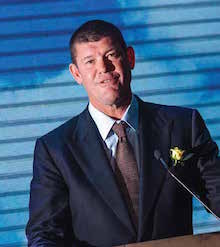
Executive Director
Crown Resorts
Co-Chairman
Melco Crown Entertainment
Imbued with an ambition surpassing on a global scale even his famous father’s, James Packer has transformed Crown Resorts into one of the gaming industry’s marquee multinationals—a US$7.95 billion powerhouse whose expansion has accelerated to the point that he’s taken the bold step of resigning as the company’s chairman to take direct charge of it.
In stepping down last month, the 47-year-old tycoon characterized Crown as his “passion”. He said, “My vision for the company is to be one of the world’s best integrated resort and entertainment providers.”
He’s a good part of the way there, judging by what the company 18 inside asian gaming September 2015 has achieved to date in Australia, Macau and the Philippines.
Earlier this year, and much to the surprise of many observers Down Under, Crown lost out to rival Echo Entertainment in the bidding for a billion-dollar resort casino in Queensland’s capital of Brisbane. But Mr Packer’s faith in his home country’s potential as a destination for China’s new wealth class remains undiminished, and he is reaping the rewards of a wise decision to reinvest lavishly to secure the international stature of Crown Melbourne and Crown Perth. Crown Melbourne, the corporate flagship and Australia’s largest single private-sector employer, has grown to encompass three hotels, 1,600 rooms, suites and villas in all, and plans are in the works to add another five-star tower with a complement of luxury apartments. Crown Perth is being remade for Asia’s burgeoning VIP trade, a process that will be capped next year with the addition of a $645 million six-star hotel.
In Macau, the opening next month of Melco Crown Entertainment’s $3.2 billion, 2,000-room Studio City is widely seen as the herald of a new era for the struggling city. In the Philippines, MCE’s $1.3 billion City of Dreams Manila has started slowly since its grand opening in February, but junket operations went into full gear this summer, and management is confident the property will begin to find its footing in the second half.
With a trusted successor in place at the helm of Crown’s board of directors, Mr Packer is turning his attention to conquering Sydney and Las Vegas for his gaming empire. The new chairman, former investment banker Robert Rankin, was appointed earlier this year to lead Consolidated Press Holdings, Mr Packer’s privately owned successor to the Australia media giant he inherited from his late father, Kerry. “Given our global growth and aspirations, this is the right time for the company to make this change,” he said at the time.
Consolidated controls just over 50% of Crown’s ASX-listed stock. But unlike his father, a rough-and-tumble businessman famed for his outsized appetites and titanic blackjack wagers, Mr Packer prefers gambling on casinos to gambling in them, and he is determined to secure his reputation beyond where his father had ventured. Australia’s largest city is one of them, and two years ago, he launched a relentless effort that succeeded in breaking Echo’s casino monopoly in New South Wales and won for Crown a license to build a competing super-resort on the last major developable site on Darling Harbour. Crown Sydney, priced at A$2 billion, is forging its way through various approvals and various legal and leasing agreements toward an opening slated in late 2019 or early 2020. Conceived as an exclusive playground for the rich, it will feature 350 rooms and suites and a cache of luxury residences in a skyscraping six-star hotel tower. A pool and world-class spa, conference and meetings facilities and a collection of high-end shops and signature restaurants will round out the offering together with a boutique, tables-only casino for the VIP crowd.
If all goes to plan, Mr Packer will have already made his mark in Las Vegas by the time it opens. Crown has laid out US$280 million for a stake in 34.5 vacant acres of prime North Strip real estate purchased out of foreclosure as the future home of Alon Las Vegas, a joint-venture super-resort funded by Crown and US hedge fund giant Oaktree Capital Management and headed by Andrew Pascal, former president and COO of Wynn Las Vegas. Crown expects its end to total as much as $500 million in exchange for majority control of the project, whose final cost will top out at $1.6 billion-$1.9 billion.
“We’ve always kept our eye on Las Vegas,” Mr Packer said when the land acquisition was announced last August. “You can’t be in the gaming industry and not have a special reverence for Las Vegas—that’s where it all began.”
It’s also where Mr Packer has some history to overcome. Israeli developer El-Ad paid $1.2 billion for the site eight years ago at the height of the property bubble, only to see its plans for a $5 billion New York-themed megaresort called the Plaza Las Vegas crash and burn in the Great Recession. Mr Packer was busy losing around $1 billion himself at that time in a series of miscalculations that included two abortive Strip projects he has since acknowledged as a “disaster.”
Of course a lot has changed since. Las Vegas is back. Crown is a bigger, stronger company. Mr Packer is smarter and more experienced. Notably, one thing he did come away with from his first foray into Sin City was a $22 million stake in Caesars Entertainment, which provided Crown with an interest in a separately traded subsidiary, Caesars Growth Partners, whose holdings include the lucrative Caesars Interactive brand. He’s been working ever since at expanding Crown’s footprint in the larger media world. He’s upped the company’s 50% equity interest in Betfair Australasia to 100%, and expanded into online bookmaking with CrownBet, a majority-controlled partnership with Internet innovator Matthew Tripp’s BetEasy. Earlier this year, he moved into the social gaming space when he spent $27.5 million for a 60% stake in Texas-based DGN Games and has committed another $5 million to support its development.
In December 2012, Packer and Hollywood producer Brett Ratner formed a joint venture, RatPac Entertainment, to make independent films and co-produce some bigger-budget ones, the first of which, the outer space thriller “Gravity,” starring George Clooney and Sandra Bullock, was a box office smash.
Mr Packer leveraged that success to back the highly publicized short promoting Studio City’s opening that was directed by Martin Scorsese and features Robert DeNiro, Leonardo DiCaprio and Brad Pitt.
As for Alon, it will be anything but another pricey Strip big box. It’s designed instead around a collection of intimate spaces, the smallest, at a very un-Vegas-like 50,000 square feet, is the casino itself. The focus will be on entertainment, dining, retail and an upscale hotel offering, two hotels, in fact, one of them a dedicated VIP tower comprising 900 rooms and suites and a select number of separate residences, dubbed “maisonettes,” for the VVIPs. A “black box” theater is planned, with seating for only 500. The shops, on the other hand, will cover a whopping 156,000 square feet, a portion of which will front a 27,000-square-foot lake. There will be a nightclub and day club, staples of today’s Strip, the latter surrounding an 81,000-square-foot pool.
Mr Pascal has said Alon will “bring a fresh, new approach to what we think the future of Las Vegas should be.”
James Packer intends to be a major player in that future.
9 James Murren
Chairman and CEO
MGM Resorts International
MGM Macau is the biggest revenue generator in Las Vegasbased MGM Resorts International’s bulging portfolio of gaming, hospitality and entertainment assets, which also boasts 16 US casinos, including signature Las Vegas Strip resorts Bellagio, MGM Grand, Mandalay Bay and The Mirage.
But the revenue and EBITDA contribution from MGM Macau, operated by MGM China Holdings in which MGM Resorts International holds a 51% stake, has been declining in line with Macau’s current travails.
In the second quarter of 2015, MGM Macau generated US$557 million in revenue, down 33% from $828 million in the year-ago quarter, while adjusted property EBITDA fell 37% to $132 million. The property’s share of total revenue generated by all resorts owned or managed by MGM Resorts International declined from 32% in the second quarter of 2014 to 23% in Q2 2015. The group’s wholly owned US properties, however, generally saw improved performances, with total revenue up 4% to $1.7 billion. The notable exception was the company’s second biggest earner, Bellagio, where revenues, which rely heavily on Chinese high-rollers, were down 4% in the quarter.
During its second quarter earnings announcement, MGM China reiterated that the $3 billion, 1,500-room MGM Cotai was on budget and schedule to open in the fourth quarter of 2016. Ahead of MGM Cotai coming online the company is short of hotel rooms, with a mere 582 at MGM Macau, which opened in 2007 on the city’s peninsula. “We have been tremendously capacityconstrained on hotel rooms in Macau,” noted James Murren, chairman and CEO of MGM Resorts International. MGM China also needs more tables—of the 5,814 gaming tables in Macau as of the end of June 2015, it operated just 427, by far the lowest count in town.
The additional capacity at MGM Cotai will be crucial to supporting the company’s steady shift in focus away from the VIP segment towards the high-margin main floor business. A record high of 80% of MGM China’s profit derived from the mass segment in the second quarter, with an additional 49 gaming tables being shifted from VIP to mass, which now represents close to 60% of the previously VIPcentric MGM Macau’s table allocation.
In addition to MGM China’s contribution to MGM Resorts International’s bottom line via dividends and license fees, the Macau operation also drives business to the company’s US properties. “The combined efforts of the US operators that are in Macau, bringing customers to Las Vegas, benefits all of us here,” acknowledged Mr Murren.
Prior to the $1.5 billion MGM China IPO on the Hong Kong Stock Exchange in May 2011, MGM had held a 50% stake in the Macau operation. Pansy Ho, daughter of erstwhile Macau casino monopolist Stanley Ho, held the other 50%. Ms Ho pocketed the proceeds of the 20% public offering and privately sold an additional 1% to MGM at the IPO price so it could assume a controlling interest. Ms Ho’s stake was diluted to 29%.
Given the property’s importance to the parent company’s earnings, engineering that buyout may be one of the smartest investments Mr Murren has made since becoming chairman and CEO of MGM Resorts in December 2008. He had joined the company as CFO in 1998, prior to which he had pursued a career on Wall Street that saw him lead a pivotal recapitalization of the company’s predecessor, MGM Grand Inc., in 1996 and culminated in a managing director’s position at Deutsche Bank.
Mr Murren is credited as the architect of the key acquisitions— Primadonna Resort & Casino in 1998, Mirage Resorts in 2000 and Mandalay Resort Group in 2005—that transformed MGM into one of the world’s largest gaming companies. They also loaded it with debt. Since 2008, he has led an extensive corporate recapitalization and cost-cutting which together kept the business afloat during the financial crisis and has helped it weather a challenging Las Vegas market since.
The major drag on the company’s balance sheet when the financial crisis hit was CityCenter, the $8.5 billion resort and retail megacomplex that was under construction at the time in partnership with Dubai World. Getting CityCenter open in December 2009 has to rank as another of Mr Murren’s great achievements, but the resort has struggled to produce the earnings that were anticipated for it, and the cash flow contributed by MGM China has been crucial to Mr Murren’s ongoing efforts to manage the company’s US$12.5 billion in debt.
While the herculean task of debt reduction has consumed the better part of Mr Murren’s seven years at the helm, his strength as a strategic thinker has worked to keep the company as innovative and opportunistic as it is big.
Its MGM Hospitality arm has progressed from vision to reality, opening two luxury resorts in Sanya on China’s Hainan island. MGM Grand, Bellagio and SkyLofts hotels are planned or in various stages of development in North Africa, in Dubai and Abu Dhabi and in India, and a number of five-star properties are being mapped for cities across China in partnership with renowned Diaoyutai State Guesthouse. All these are expected to drive visitation to MGM Resorts’ gaming properties in Macau and the US.
“It’s still early days on hospitality,” said Mr Murren. “Once we open a hotel in a major market like Beijing or Shanghai, the two projects that are under development right now, that will have a bigger impact [on the company’s US operations]. But as we stand right now, our two hotels are in Sanya, which is in Hainan Island, which really more benefits MGM Macau.”
Next: The Asian Gaming 50 – 2015: 10-20








